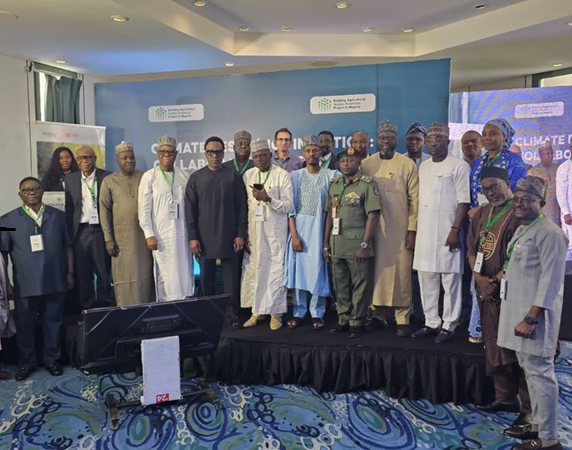
Urgent and coordinated climate action is essential to mitigate the increasing impact of climate change on agriculture and to protect vulnerable smallholder farmers, particularly women and youth-led micro, small and medium enterprises (MSMEs), according to the Agricultural Technology Foundation (AATF).
This statement was made by the AATF’s Dr. Kayode Sanni at the opening of a high-level conference titled “Climate Resilience in Action: Collaborative Approaches to Adaptation”, co-hosted in Abuja by AATF, Michigan State University (MSU) and Sahel Consulting, with support from the Gates Foundation and the Gombe State government.
“As climate change accelerates, its effects on Africa’s agricultural systems are becoming more severe and deeply felt, especially by smallholder farmers who depend on predictable seasons, fertile soil and stable ecosystems to feed their families and communities,” he said.
Sanni emphasised that women and youth, who make up the backbone of Africa’s agricultural workforce, are disproportionately impacted by climate variability. “They are not only essential to today’s food production, but also vital to the future of food and nutrition security across the continent,” he added.
He reaffirmed AATF’s commitment to building a resilient and food-secure Africa through innovation and collaboration. “Our vision is clear: a prosperous, resilient, food and nutrition-secure Africa powered by inclusive, scalable technology and strong partnerships. The challenges are too vast for any single actor to solve alone,” he said.
Highlighting one of the foundation’s ongoing collaborative projects, Sanni cited a multi-institutional initiative with Michigan State University, University of Nigeria, Nsukka, Benue State University, the Gombe State government and the Cereal Growers Association of Kenya. The project focuses on empowering women- and youth-led MSMEs in the rice value chain by equipping them with a climate-smart decision support system.
This system provides real-time, actionable data on weather patterns, agronomic practices and soil health, tools that help farmers make informed decisions, boost productivity and strengthen their resilience to climate shocks. Currently implemented in three Nigerian states, the initiative has shown promising results. Sanni called for broader replication to reach more communities across the region.
“We must be bold in our vision and deliberate in our execution,” he told attendees. “Let us forge enduring partnerships, replicate what works and equip our farmers not just to survive climate change, but to thrive in the face of it.”
Also speaking at the event, an assistant professor at Michigan State University and lead on weather station development, Dr. Daniel Uyeh showcased recent innovations in climate adaptation. “We’ve developed an open-source, affordable, and locally manufactured weather station system,” he said. “These stations are already delivering hyper-local, real-time forecasts that are helping farmers in Nigeria and Kenya adapt to changing weather patterns.”
However, Uyeh stressed that technology alone is not enough. “To succeed, we must pair innovation with strong collaboration and community engagement,” he added.
Speaking further, director-general of the Nigerian Meteorological Agency (NiMet), Prof. Charles Anosike emphasised the urgent need to modernise the nation’s weather monitoring infrastructure. “Over 60 per cent of weather data in Nigeria is still collected manually, often by non-professionals. To improve accuracy and coverage, we must scale up the deployment of automatic weather stations,” he said.
He also advocated for increased investment in digital tools and mobile-based early warning systems to help farmers anticipate and mitigate the risks posed by climate change while enhancing agricultural productivity across the board.


